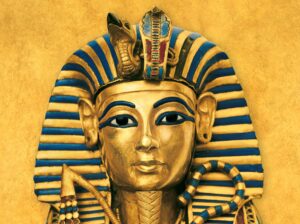Our founder, Leila Amineddoleh, was interviewed by Turkish news channel, TRT, to discuss a controversial international exhibition of objects from the tomb of Egypt’s famed King Tutankhamen. (A video of the interview is below.) The discovery of King Tut’s tomb in 1922 sparked a resurgence in the interest in ancient Egypt. Any exhibition related to his remains and treasures is sure to attract huge revenue and worldwide attention. The exhibition, Tutankhamun: Treasures of the Golden Pharaoh, features 150 objects owned by Egypt.
Nations enact cultural heritage laws to protect their heritage for the benefit of their citizens, future generations, and all mankind. Artifacts have a value greater than their commercial prices, and it is the responsibility of nations to protect these resources. In fact, Egypt has some of the world’s oldest laws protecting antiquities and regulating their trade. Egyptian antiquities have long been a source of fascination for Western collectors. Due to that market interest, Egypt has protected its artifacts with legal tools. The nation actively safeguards its antiquities with cultural heritage protection laws dating back nearly two centuries. The first law, an 1835 decree, banned the unauthorized removal of antiquities from the country. During the intervening nearly two centuries, the nation has periodically updated those laws to effectively protect ancient sites and prevent looting.
The Supreme Council of Antiquities (Egypt’s cultural ministry) may have broken the nation’s cultural heritage laws by engaging a private commercial company, IMG, to exhibit valuable artifacts in shows around the world. However, there are some vague terms in Egypt’s cultural heritage law that might make it difficult for an Egyptian lawyer to successfully sue the Supreme Council. (For example, the law does not define what makes certain artifacts “unique” and prohibited from loans.)
It is easy to understand how some Egyptians feel betrayed by the Supreme Council. The nation’s rich cultural heritage was not intended to be exploited by government officials for their own personal use or financial gain. The nation’s antiquities play a central role in its citizens’ identities and the identity of Egypt. Some Egyptians feel that artifacts from King Tut’s tomb are a national treasure and so they should not be touring internationally, but should remain in Egypt, their home. The Arab republic’s cultural heritage laws were passed with the purpose of protecting heritage for future generations and to protect the property from exploitation and destruction. In fact, the introduction (written by Zahi Hawass) of the 2010 amendment to Law 117 addresses the importance of heritage protection for the “honor of Egypt and Egyptian history.” It also states, “The memory of the homeland is the right of future generations, and our duty to them is to keep this memory alive and vibrant.”

Copyright: National Geographic
Whereas the Egyptian government touts the value of the international exhibition, stating that it has brought in millions of dollars to the country, there is potential harm. The objects from the exhibition will not be back in Egypt in time for the monumental opening of the Grand Egyptian Museum (a $1 billion project), and the exhibit may divert tourism revenue away from Egypt and instead to the commercial exhibition company, IMG. In addition, any international exhibition is accompanied by risks inherent in traveling and reinstallation.
Various elements addressed in the BBC documentary about the exhibition seem to suggest that the loan is the result of political corruption, with former and current members of the Supreme Council of Antiquities receiving financial benefits by agreeing to the loan. Private companies have hired former and current members of the Supreme Council to serve as tour guides, sell products, and engage in commercial activity related to Egyptian antiquities. The current exhibition schedule is indefinitely delayed during the COVID-19 pandemic, but it will be interesting to see how the controversy is resolved and whether the artifacts from the “Boy King” will return home in time for the opening of the Grand Egyptian Museum.